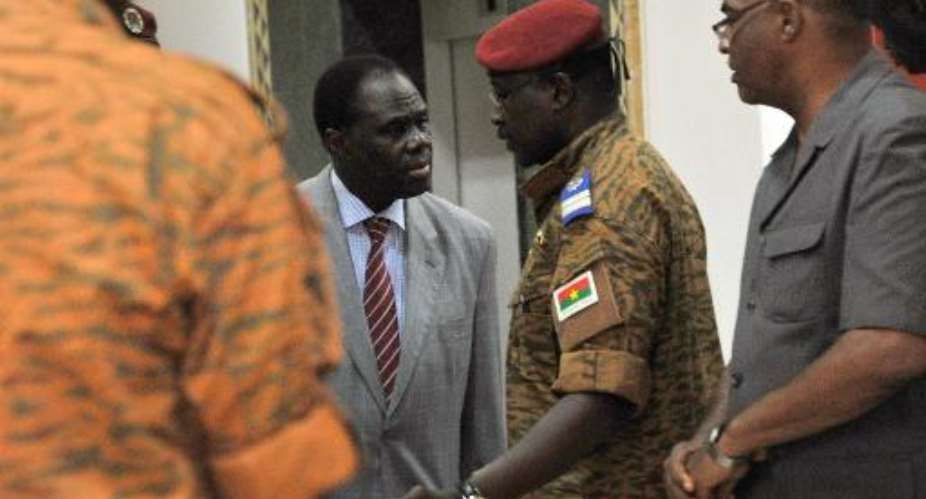Ouagadougou (AFP) - Burkina Faso's newly chosen President Michel Kafando will on Friday officially take over from military strongman Isaac Zida, three weeks after the ouster of veteran leader Blaise Compaore.
Under arrangements for a phased return to democratic rule, Lieutenant Colonel Zida will become prime minister in an interim government, ensuring that the military retains a say in power under Kafando, a 72-year-old career diplomat.
"The military in Burkina is part of the political picture," Senegalese President Macky Sall, envoy for the west African bloc ECOWAS during the Burkinabe crisis, said Friday in Paris.
"Our job is to accompany the process, to stand by Burkina in this year of transition and enable it to return very rapidly to constitutional legality," Sall added.
Seven African heads of state -- including that of current ECOWAS chair Mauritania -- have confirmed their presence at the handover ceremony Friday at 5:00 pm (1700 GMT).
Zida, 49, was appointed premier by Kafando on Wednesday, a day after the former UN ambassador and onetime foreign minister was sworn in.
Chosen following negotiations between political parties, the army and civil society, Kafando has sought to emphasise his "humility" as a leader entrusted with "power that belongs to the people".
His ousted predecessor, meanwhile, flew into Morocco on Friday from Ivory Coast where he fled after his 27-year rule was ended on October 31 by a popular uprising against a constitutional change that could have enabled him to stay in power.
The Moroccan foreign ministry said the 63-year-old Compaore, travelling with five other people, was in the country on a temporary visit, without giving a time-frame.
- No 'banana republic' -
Kafando has pledged he will not let the landlocked nation of 17 million people become a "banana republic", but observers have pointed to the powerful role the military is set to retain.
"Make no mistake, it's (Zida) who will lead the country," said a diplomat, on condition of anonymity.
Zida, then second-in-command of the presidential guard, was installed in a military power grab in the immediate aftermath of the uprising against Compaore.
Under intense international pressure and the threat of sanctions if the military retained the post of head of state, an agreement was thrashed out to work towards elections in November 2015.
Zida is expected to name army officials to the key positions of defence, finance and social affairs in his new 25-member government on Saturday, said another diplomat.
They will lead a 90-seat parliament, known as the National Transitional Council, during the year-long administration.
Both Kafando and Zida are barred from standing in elections scheduled to be held in November next year under the transition deal.
On Wednesday, Zida urged the Burkinabe people and the international community "to accompany us without prejudice" towards a peaceful transition, insisting the government would make no "selfish calculations".
He has already dismissed the heads of two public companies close to Compaore's family, accusing them of "sabotage", and suspended municipal and regional councils widely held to be corrupt.
- 'Error of judgement' -
Some civil society representatives said they were concerned over Zida's appointment, but were willing to be patient until they see how he performs.
"We are worried, but that's all," said Guy Herve Kam, spokesman for the Balai Citoyen (Citizen's Broom) group, whose mobilisation of young protesters contributed to Compaore's fall.
Some residents of the capital Ouagadougou have called Zida's appointment a betrayal of their "revolution" in Burkina Faso, known as the "land of upright men" since army captain Thomas Sankara came to power in a 1983 coup in the former Upper Volta.
Sankara, a widely loved Marxist and pan-Africanist young leader, was killed four years later when his former comrade in arms Compaore seized power.
Burkina Faso notably exports cotton and gold, but almost half the population lives on less than $1 dollar a day and many are subsistence farmers.
Every change of regime in the country has been triggered by a coup since independence from France in 1960.
During the uprising against Compaore, protesters set the parliament building ablaze.
On Wednesday his party, the Congress for Democracy and Progress, said in a statement it had made a "an error of judgement" in trying to extend Compaore's rule.





 Akufo-Addo spotted ordering chiefs to stand for his handshake
Akufo-Addo spotted ordering chiefs to stand for his handshake
 Akufo-Addo ‘disrespects’ every chief in Ghana except Okyenhene — NDC Communicato...
Akufo-Addo ‘disrespects’ every chief in Ghana except Okyenhene — NDC Communicato...
 Supreme Court clears way for dual citizens to hold key public positions
Supreme Court clears way for dual citizens to hold key public positions
 Be transparent, don’t suppress the truth – Prof. Opoku-Agyemang to Jean Mensa
Be transparent, don’t suppress the truth – Prof. Opoku-Agyemang to Jean Mensa
 ‘I won’t tell the world I was only a driver’s mate during challenges’ – Prof Jan...
‘I won’t tell the world I was only a driver’s mate during challenges’ – Prof Jan...
 We’ll prosecute corrupt officials of Akufo-Addo’s govt – Prof Jane Naana
We’ll prosecute corrupt officials of Akufo-Addo’s govt – Prof Jane Naana
 [Full text] Acceptance speech by Prof Jane Naana Opoku-Agyemang as 2024 NDC Runn...
[Full text] Acceptance speech by Prof Jane Naana Opoku-Agyemang as 2024 NDC Runn...
 Election 2024: Don’t be complacent, we haven’t won yet – Asiedu Nketia cautions ...
Election 2024: Don’t be complacent, we haven’t won yet – Asiedu Nketia cautions ...
 Election 2024: Stop fighting over positions in Mahama’s next govt – Asiedu Nketi...
Election 2024: Stop fighting over positions in Mahama’s next govt – Asiedu Nketi...
 Prof Jane Naana Opoku-Agyemang will restore dignity of vice presidency – Fifi Kw...
Prof Jane Naana Opoku-Agyemang will restore dignity of vice presidency – Fifi Kw...
